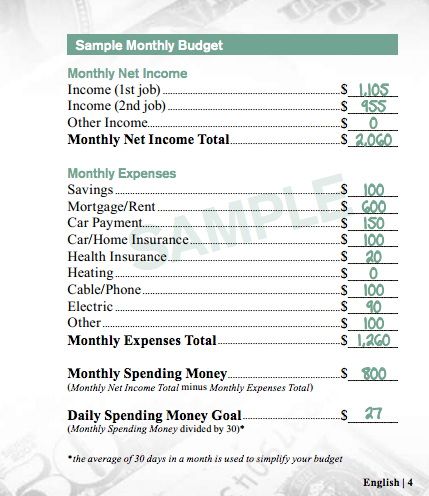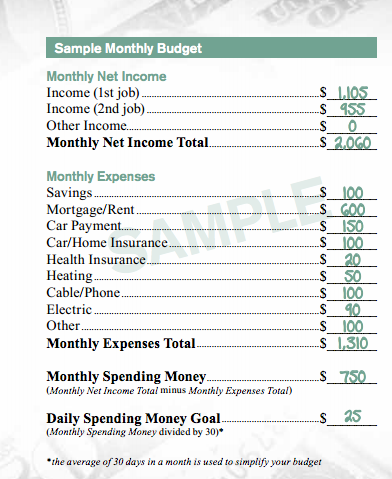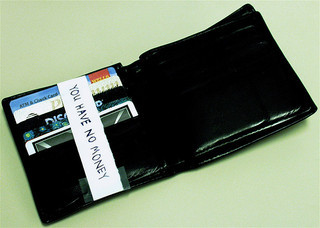We Have Some Problems With Visa’s Sample Budget For McDonald’s Employees
Someone meant really well. We think. A few years ago, Visa and McDonald’s partnered to launch a personal finance site for McDonald’s employees to help them better manage their money. Unfortunately, whoever wrote these materials had no grasp of what it’s actually like to live on $8 or so per hour.
“Helping you succeed financially is one of the many ways McDonald’s is creating a satisfying and rewarding work environment,” the site’s About page explains. The path to financial freedom, according to Visa and McDonald’s, involves turning off your heat, not buying groceries, not having children, never getting sick, and getting a second job. All of which are sound money-saving strategies, it’s true, but it’s not all that realistic to expect people to combine them.
You can download their handy budget workbook yourself. First, in the “income” column, you, the Hypothetical McDonald’s Employee, have two jobs. One job pays $1,105 per month, and the other pays $955 per month. This amount is what someone would earn working roughly 60 hours a week at $8.50 an hour. If you earn less per hour than that or this is after taxes, then you’re either working more hours or have a higher hourly wage. The budget doesn’t specify whether this is gross income or after taxes: even for someone in a low enough tax bracket that they pay no federal or state income taxes, Social Security and Medicare still takes 6.2% out of every check.
Anyway, Visa and McDonald’s produced a handy workbook for employees to learn how to budget their money, spend sensibly, and save for the future and for emergencies.

UPDATE: McDonald’s and Visa have apparently listened to [some of] the Internet’s criticisms, and changed the budget to include heat. They sneakily replaced the PDF workbook on the server with the new version, but we downloaded the original and have had it on the server for you all this time. The version on their site now allows $50, so that’s nice of them. Here’s the revised budget:

Savings: $100
No quibble with this. Everyone should be putting some money in a savings account (or shoebox, whatever, but a savings account is a better idea.)
Mortgage/Rent: $600
This is a realistic figure in most of the country if you share a home with family or roommates, but not so much if you live by yourself or don’t yet have good enough credit to get a fixed-rate mortgage on a modest condo.
Car Payment: $150
Not a bad figure, but that’s probably an older car, so hope you have money put away for repairs.
Car/Home Insurance: $100
That sounds pretty reasonable, though again, a person working to rebuild their credit might not get a great rate on carinsurance.
Hey, wait a second, there isn’t any more mention of a car on this budget. How are you supposed to repair and maintain this vehicle? Even changing your own oil and having a friend do major repairs in their front lawn costs money for parts.
That might not be a problem, though, because there’s also no budget line for gasoline. Guess you’ll be making a car payment while you walk to work.
Health Insurance: $20
I don’t know what planet has health insurance plans that cost $20/month, but can I move there? Even a lot of civil service and union workers pay more than that now. Plus, insurance is nice and all, but there are these things called “co-payments” that also cost money. The cheaper your health insurance is, the higher those payments will be. Also, I miss those heady days when I was so young and healthy that I never had to buy cold medicine, bandages, painkillers, or cough syrup. Which was never.
Heating: $0
This is the case for a large portion of the year, and people in some parts of the country never turn on their heat. The rest of the time, maybe you’ll have to bring leftover hamburger buns home and burn them for warmth.
Cable/Phone: $100
No, heat, no groceries, but a phone and basic cable. Or a smartphone with a large data plan. Or cable, home Internet access, and no mobile phone. Hmm.
Electric: $90
Maybe in the spring and fall, but good luck with that when you start running air conditioners and baseboard heat.
Other: $100
Is this where the gas goes?
Spending Money: $800
Okay! Straight into savings with you, then!
Except, wait…this is a terrible budget. Besides leaving out gas, heat, car maintenance, and remotely realistic medical expenses, it leaves out clothes, entertainment, furniture, various kinds of personal hygiene, furniture, charitable and religious giving, cleaning supplies, and groceries. GROCERIES.
It also completely ignores that you might have children, which is convenient, because it’s hard to fit child care for those 60 hours a week that you’re working into this budget. Assuming that you can even get that many hours from your job: maybe it’s time to start looking for a third one.
Like we said, whoever produced this workbook probably meant well. It has helpful and slightly condescending money-saving tips, like:
- When possible, use public transportation or carpool
- Consider walking or riding a bike when running errands
- Plan meals in advance
- Borrow books and movies from the library
- Shop with a list
- Pay down debt as quickly as possible
- Try not to use an ATM outside of your bank’s system to avoid extra service charges
We would probably just roll our eyes and move on, if it weren’t for this tiny thing on the McDonald’s Practical Money Skills page. The first page on the navigation bar of this site produced by McDonald’s and Visa extolls the benefits of prepaid debit cards. Where have I heard about those recently?
Why should you consider getting your paycheck on a PaychekPLUS! Elite® Visa® Payroll Card? There are ways to access your money that don’t even involve any fees, you can use it to pay bills, and there’s no waiting. You don’t have to cash or deposit a check, and you don’t need to have a bank account. You can just use the card right away to pay for things.
Just don’t gas up your car or go to the grocery store.
Practical Money Skills For Life [Official Site]
Practical Money Skills Budget Journal [PDF]
Bonus content: FightFor15/LowPayIsNotOK, organizers of fast food strikes across the country, are the ones who uncovered this gem on the Practical Money Skills site. They made this handy video:
Want more consumer news? Visit our parent organization, Consumer Reports, for the latest on scams, recalls, and other consumer issues.


